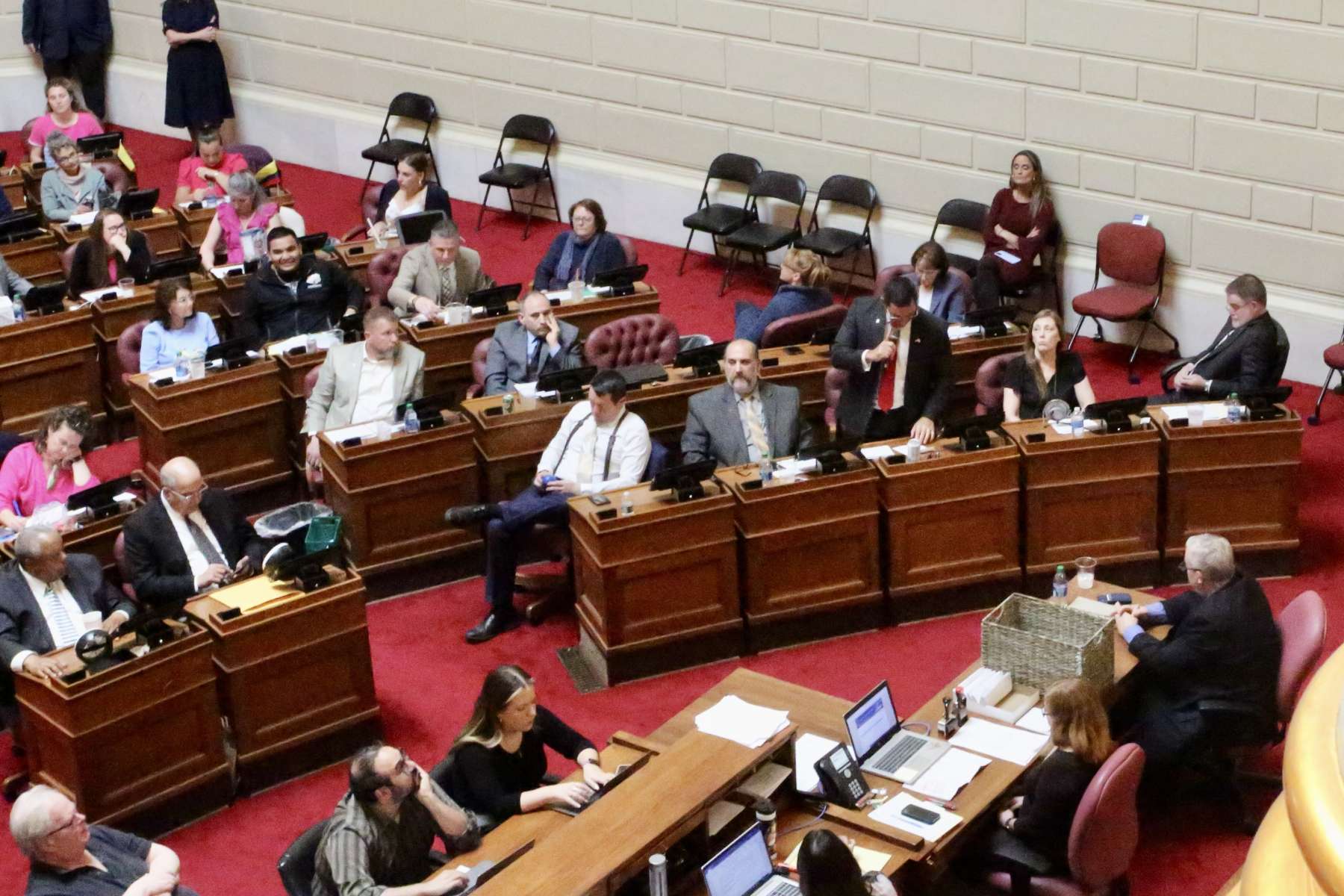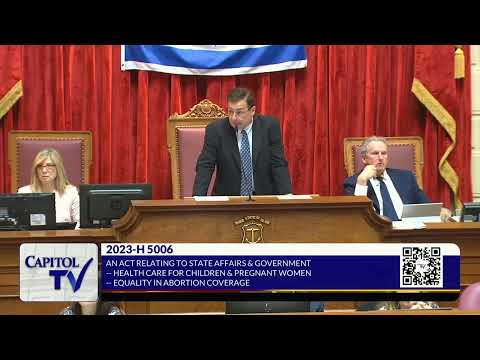Once again, Rep Quattrocchi, the RI General Assembly can pass laws on the funding of abortion
“Mr. Speaker, I feel that to vote either way on this is a violation of my oath of office. I believe that I would like, out of an abundance of caution, a recusal form.”
April 29, 2023, 2:25 pm
By Steve Ahlquist
During Thursday’s Rhode Island House of Representatives floor debate ahead of the overwhelming passage of the Equality in Abortion Coverage Act (EACA), perpetually confused Representative Robert Quattrocchi (Republican, District 41, Scituate) rose to ask a question. How, wondered Representative Quattrocchi, is passing the EACA not a violation of the Rhode Island State Constitution, which contains a clause that says, “that nothing in this section shall be construed to grant or secure any right relating to abortion or the funding thereof”?
Representative Katherine Kazarian (Democrat, District 63, East Providence), who sponsored the legislation, gamely rose to answer Representative Quattrocchi, explaining that the chamber had already debated this question in 2019 when the state passed the Reproductive Privacy Act, which essentially codified the protections of Roe v. Wade into state law.
Representative Quattrocchi was unconvinced, rejecting Representative Kazarian’s answer as “the same legalese dance that went around and around in [the] Finance Committee and no one actually had an answer to it – the Constitutional question.”
Representative Quattrocchi then did something extraordinary.
“Mr. Speaker, I feel that to vote either way on this is a violation of my oath of office. I believe that I would like, out of an abundance of caution, a recusal form.”
What Representative Quattrocchi seems to be saying with this action is that his oath to defend the Constitution of Rhode Island is in conflict with voting for, or against, the EACA. And this simply is not true. 49 members of the House voted for, and 24 members of the House voted against, the EACA, experiencing no constitutional conflict, or legal repercussions, in doing so.
Worse, there is a Rhode Island Supreme Court decision, that Representative Quattrocchi should be aware of, that clarifies exactly why both the Reproductive Privacy Act and the EACA do not violate the state constitution, and worse still: This has been explained to Representative Quattrocchi many, many times, and he either refuses to understand, or is incapable of understanding, the pretty straightforward explanation.
Uprise RI took on the problem of explaining it all in a piece entitled, “Yes Rep Quattrocchi, the RI General Assembly can pass laws on the funding of abortion” less than a year ago. We appreciate that Representative Quattrocchi is not a reader of our reality-based news site, but we did go the extra mile and address the piece to him by name, so we’re a little hurt.
But anyway, to clarify, in Michael Benson et al. v. Daniel McKee in his official capacity as Governor for the State of Rhode Island, et al., a case challenging the constitutionality of the Reproductive Privacy Act, the Rhode Island Supreme Court analyzed the abortion language in the Constitution. Long story short: There is no conflict.
Below is some of the text from the decision, cleaned up a little:
“In 1986 the Rhode Island Constitutional Convention… revised article 1, section 2 of the state’s constitution to include the due process and equal protection language of the Fourteenth Amendment to the United States Constitution…
“The drafters’ rationale for adding a parallel yet independent equal-protection clause was presumably to protect the citizens of this state should the federal judiciary adopt a more narrow interpretation of the Fourteenth Amendment…
“Significantly, however, the drafters inserted a sentence declaring that ‘[n]othing in this section shall be construed to grant or secure any right relating to abortion or the funding thereof’…
“This Court has said that, in construing constitutional amendments, our chief function is to give effect to the intent of the framers. When the language in a provision of the constitution is ‘free from ambiguity, the[] [words] are to be given their plain, ordinary, and usually accepted meaning.’ Importantly, ‘state constitutional and statutory law is subordinate to the constitutional powers of the federal government, and ‘the Constitution and the laws passed pursuant to it are the supreme laws of the land, binding alike upon states, courts, and the people’…
“A plain reading of article 1, section 2 reveals that the language in the last sentence is clear and unambiguous…
“First, it is confined to that section of the constitution; it reads, “[n]othing in this section shall be construed to grant or secure any right relating to abortion or the funding thereof.” (emphasis added)…
“Second, this sentence employs the term ‘construed.’ which connotes a judicial function, defined by Black’s Law Dictionary as ‘[t]o analyze and explain the meaning of (a sentence or passage…
“Construing provisions in the state’s constitution is the function of this Court, and we have not been called upon to do so in the context of this case. But in no way has the General Assembly been prohibited from enacting the legislation at issue in the case at bar. The General Assembly enacts law; it does not interpret or construe the constitution – that is the function of this Court…
“We pause to note that at the close of the 1986 Constitutional Convention, the public voted to approve and ratify or reject fourteen proposed constitutional amendments by way of referendum…
“Ballot Question No. 8, the proposed amendment to article 1, section 2, was approved. Notably, Ballot Question No. 14,16 an amendment effectively banning abortion in Rhode Island, was also on the ballot in 1986. The question failed. The submission of these two distinct questions to the voters convinces us that article 1, section 2 prohibits the drawing of any inferences concerning the right to abortion or its funding arising from the due process and equal protection provisions of the state constitution…
“We are of the opinion that the enactment of the RPA did not amount to a constitutional amendment requiring a referendum…“







